- Home
- Freida McFadden
The Locked Door Page 2
The Locked Door Read online
Page 2
I’m not having a midlife crisis. I just needed a safe vehicle to get from point A to point B with as little fanfare as possible.
The parking lot of Christopher’s is nearly silent as I slide into the driver’s seat of my Camry. I start the engine and classical music fills the car. Chopin’s Nocturne in C. I used to play the piano, and I learned this piece for a concert in high school. That feels like an eternity ago. I haven’t touched piano keys in at least a decade.
I get back on the road. It’s quiet like it always is on weeknights. I ease my foot onto the gas, taking the back roads like I usually do to get home.
After about two minutes of driving, I notice the pair of headlights behind me.
It doesn’t necessarily mean anything. So there’s a car driving behind me. So what? But at the same time, I’m usually the only one driving on these back roads at this hour. Usually, it’s just me and the stars. And maybe the moon, depending on the time of the month.
Also, the car is following me very closely. I’m going at least ten miles above the speed limit for this small road, and the headlights are probably less than two car lengths behind me. If I stopped short, they would almost certainly rear-end me.
I suspect this car might be intentionally following me. But there’s only one way to know for sure.
I approach a fork in the road. I signal left. As I come to the fork, I start to veer left. But at the last second, I swerve right.
I have my eyes pinned on the rearview mirror the entire time. I watch the headlights behind me as they start to move left, then start to veer to the left of the fork as I sail to the right. And then, the car skids to a halt. The car backs up, then turns right at the fork.
I inhale sharply, my hands squeezing the steering wheel. The other car is definitely following me. That bastard is following me.
As I contemplate my next move, a thought flits through my head. One that I have not infrequently when I’m in difficult situations:
What would my father do?
I always have that thought, as much as I try not to. I don’t want to know what my father would do. And I certainly don’t want to do the same thing he would do. After all, he’s the one spending eighteen life sentences in prison right now. Not exactly something I want to strive for.
I have my phone in my pocket, hooked up to my Bluetooth. I could call the police. I could tell them my location and that there’s a car following me. But I don’t do that either.
At the next corner, I usually turn right to go home. But instead, I turn left. The car behind me turns with me. The headlights flood my car as the other vehicle creeps closer to mine. They’re not even trying to hide the fact that they’re following me. Two car-lengths have now become one car-length. They’re riding my rear bumper.
Then I see my destination up ahead. The local police department.
I pull into the parking lot at the police department. I keep my eyes on the rearview mirror, waiting to see if the driver will have the gall to follow me into the police station parking lot. But instead, the headlights disappear from my rearview mirror, just as I suspected they would. As I pull into a parking spot, I see the car that had been following me drive past.
It’s a blue Dodge with a dent in the rear fender.
I sit in the parking lot of the police department for the next ten minutes, watching the road, making sure the car that had been following me is long gone. This is not my favorite place to be. I remember the first time I ever visited the police department. I was ten years old. My father had just been arrested. The police had so many questions for me.
Nora, how long did your father keep a workshop in the basement?
Nora, did your mother ever go down there?
Nora, are there any other secret hiding places in your house?
Another woman might have marched into the police station. Asked for an escort home. Reported Henry Callahan for following me. But it won’t do me any good. And the thought of entering a police station makes me physically ill. After what I went through all those years ago, I never want to go into a police station ever again.
After all, a simple background check will reveal exactly who I am. I don’t need that.
After ten minutes, I feel satisfied that Callahan is finally gone. Sure enough, when I get back on the road, it’s as quiet and empty as it usually is. It takes me another fifteen minutes to arrive at my cozy two-story house in Mountain View. The realtor said the house was perfect for a small family, but it’s just me. There was a time when I thought it might not always just be me, but in retrospect, that was misguided.
There are two bedrooms upstairs, and I use the second bedroom for my home office slash guest room. The washer and dryer are in the basement. When Philip came to visit soon after I bought the place, he wrinkled his nose and remarked that I could afford better. Yes, I could, but I’m happy here. What on earth would I do rattling around a five-bedroom house all by myself? It’s not like I’ll ever have children to fill up those rooms.
I come in through the garage entrance. The door echoes as it slams shut, and after the sound dies off, the house becomes deathly silent. I stand there for a moment, clutching my keys in my right hand.
“Honey, I’m home!” I call out.
It’s funny because, you know, I live alone.
I stand there for a moment, listening to the echo of my words throughout the room. I worry sometimes about living alone. If somebody came into my house and were waiting for me here, who would know?
But it’s a safe neighborhood. I don’t usually worry about stuff like that.
I’m starving. If I hadn’t had to deal with Henry Callahan trying to scare me, I would’ve swung by In-N-Out Burger on the way home—part of my campaign to drop dead of a heart attack before I’m fifty. But I missed my chance, so I go to the kitchen to see what’s in the freezer. I need some food to soak up the whiskey. And then maybe another whiskey to soak up the food.
No, I really shouldn’t. It’s getting late and I have to be up at the crack of dawn to operate in the morning. I don’t need much sleep as a rule, but my eyelids are starting to feel heavy.
As I open the cupboard in the kitchen, I hear a thump. Then a second thump.
Somebody’s trying to get in the back door.
Thump.
I was waiting at the police station for at least ten minutes. Henry Callahan was gone. He didn’t follow me home—I’m sure of it. I was watching in my rearview mirror the whole time and I didn’t see any cars behind me. I would have noticed, even if their lights were off. I’m very observant.
I look out the window, but I see only blackness. There’s no one there.
Like I said, I live in a very safe neighborhood. All my neighbors are up-and-coming professionals, most of them with young families. Although I don’t know for certain, because I haven’t taken the opportunity to meet any of them. I can’t name one person living within a one-mile radius of me, although I suppose I would recognize a few of them on sight.
I imagine what they would say if something ever happened to me. She seemed nice. Quiet. Always kept to herself. That’s what they always say.
Thump.
I return to the cupboard over the sink. I yank it open and retrieve the object I’m looking for before returning to the back door. I take one last look out the window to confirm nobody is there. Then I twist the lock to the back door and throw open the door.
Instantly, the meowing starts up. There’s a black cat at my feet, who nuzzles at my pants leg with her little furry head. Then she looks up at me hopefully.
“Yeah, yeah, yeah,” I say.
I crack open the can of cat food I got from my cupboard and empty it into the little bowl I put out behind my back door. This cat is not my cat. It is a stray cat. I should probably call an animal shelter or something, but instead, I bought a crate of cat food. And now, apparently, I’m feeding the cat.
I watch the cat lap up sixty cents worth of mashed-up chicken. She’s so ridiculously grateful whenever I
feed her. Maybe even more grateful than Callahan was for having saved his life.
My father would not have done this. He wouldn’t have fed a stray cat. He never saved anyone’s life.
I watch the cat eat for another few seconds, then I shut the back door. And I lock it.
Ten minutes later, I settle down at my kitchen table with a TV dinner and my laptop. I log into our practice’s electronic medical records system. I sift through some labs, but then I find myself searching for the medical record of Henry Callahan.
It’s just as I remember. Cholecystitis. Required removal of the gallbladder. Laparoscopic surgery converted to open cholecystectomy. No post-op complications, routine recovery.
Then I click on the tab for demographics. It lists Callahan’s medical insurance. His primary contact is his brother, which means he’s not married. He probably lives alone. And right below all the phone numbers is his home address.
He lives in San Jose in a sketchy sort of neighborhood. Looks to be a house. Not far from here at all.
I could be there in twenty minutes.
Hmm.
I shake my head and close the laptop with a snap. I grab my water and take a long drink. I wish I had another Old Fashioned, but the water will have to do.
The pile of mail I retrieved from the front door is now stacked neatly in the middle of the table. I push my laptop to the side and start sorting through the letters. The first two are bills—I find it baffling that they still come, even though I pay all my bills online. The next one is soliciting a political donation. Yeah right. Then a catalog from a bakery, offering a variety of baked goods.
And the last letter is from my father.
I suck in a breath as I stare at the smooth black lettering on the back of the envelope. He always had very nice handwriting. Tight and compact, every letter the exact same height like he measured it with a ruler, the pen marks digging into the paper so that an indentation would always be left behind on the sheet below. I wonder if the postman noticed the name on the return address. If he did, he probably thought it was a joke. At least the letter is made out to Nora Davis. I haven’t been Nora Nierling in nearly twenty-six years.
He’s been writing me these letters every week since the day of his arrest. I didn’t know about them for a long time. My grandmother used to throw them out. But then after I left for college, the letters came directly to me.
What does he have to say to me? What could he possibly have to say?
I wonder if he thinks about me. Worries about me. My mother used to worry about me when I was a kid, but she’s long gone. Nobody thinks about me or worries about me anymore. Not really. Philip might worry a little bit, because if something happened to me, who would cover his patients when he went on vacation? But he doesn’t worry in any sort of real way.
I stare at that letter for a very long time. Like I do every week.
And like I do every week, I rip it in half, and rip it in half again, and toss the pieces in the garbage can.
Happy anniversary, Dad.
Chapter 3
26 Years Earlier
The cake smells really good coming out of the oven. It’s vanilla—my favorite. And my mom made it from scratch, using flour, sugar, baking powder, vanilla, and eggs. She showed me how to mix the wet ingredients and the dry ingredients separately, and then we combined them. I helped her, because she asked me to, but I don’t like baking with my mom. I would’ve been okay using the vanilla cake from the box. Or just something she bought from the grocery store bakery aisle.
Mom lowers the cake tin down onto the kitchen counter and pulls off her pink oven mitts. There are two cake tins, because she’s going to make a layer cake. That’s what I asked for. A vanilla cake with layers and cream cheese frosting.
“Can we put the frosting on now?” I ask.
Mom places one hand on each hip. She is such a mom. Like if you were reading a book about a mom, she’d probably be like my mom. Every night, she cooks dinner for us, makes sure I do all my homework, and cleans the house herself, top to bottom. (I’m technically responsible for my own bedroom, but if I get lazy and don’t do it, she mostly just does it for me.) When our neighbors are sick, she goes to check on them and brings a tub of chicken noodle soup or maybe a casserole.
“Nora,” she says. “You know we have to let the cake cool before we put the frosting on it. Otherwise, it will just melt.”
“Well,” I say thoughtfully, “then we can put on a second layer.”
Mom smiles at that. She smiles a lot. When she smiles, she has dimples and it makes her double chin look bigger. When she and my dad got married, she was skinny—almost bony—but she’s not now. I like her better this way. Who wants to hug a bunch of bones? But my dad keeps telling her she should try to lose some weight. He says it a lot.
“You have to be patient,” she says.
Usually, I’m pretty patient. Even when the other kids are fooling around in class, I always sit quietly and do what the teacher says. But today is my birthday, and the cake smells really good. So I rip the lid off the plastic tub of cream cheese frosting and rake one finger through the creamy white goodness. Mom gives me a look, but she doesn’t stop me. After all, we’re the only ones who are going to be eating the frosting.
Mmm. Cream cheese frosting.
“Are you sure you don’t want to invite any of your friends over tonight?” Mom asks me. “It’s not too late.”
“No, that’s okay.”
“But it’s your birthday, honey.”
She doesn’t have to remind me that it’s my birthday. I know it’s my birthday. Today, I am eleven years old. Next year I’ll be in middle school. I can’t wait.
Mom’s eyebrows knit together. “You have friends, don’t you, Nora?”
“Yes.”
It’s not a lie. I do have friends. There are girls I play with at recess every day. But I’ve never had a very close friend. Some of the girls call each other on the phone every night and talk until midnight. I don’t have any friends like that. And I don’t have any friends I want to invite to my eleventh birthday party.
What’s so wrong with that?
I take another scoop of frosting with my finger, and my mom gives me a look. I knew it was only a matter of time before she was going to tell me to quit it. “Go upstairs and change,” she tells me. “By the time you get back down, the cakes will be cool.”
I groan. “Why do I have to change? It’s just us.”
“It’s your birthday. It’s a special occasion. Don’t you want to look nice?”
I lift a shoulder. “When is Dad getting home?”
“He’ll be home in an hour. He’s picking up a present for you on the way back.”
I keep my fingers and toes crossed it’s another hamster, but it probably won’t be, because Mom says we have bad luck with hamsters. But I know it’s going to be something good. My dad gives the best presents.
Mom folds her arms across her chest. “Go, Nora. We’re not frosting the cake until you’re ready.”
Fine. I drop the tub of frosting on the kitchen counter, so I can go upstairs and change. On the way to the stairwell, I pass the door to the basement. Some of my friends at school have basements that are finished, where they play video games or have parties, but our basement is my dad’s workshop.
A few years ago, he got really into woodworking, and he decided to turn the basement into his workshop. So now he goes down there for hours and makes chairs and tables and stuff like that. But he’s not all that good at it. Like last month he came out of the basement with this chair he made, and it was pretty bad. Like, the legs were all different lengths. It wasn’t the kind of chair you want to sit in—it looked like it would just collapse. But Mom said we should be supportive, so I said I liked it.
I thought it would be fun to help Dad in the workshop. Not that I like woodworking that much, but I like hanging out with my dad. But he said that doing woodworking is his alone time, and it helps him relax. I don’t know why
he can’t relax with me around, but whatever.
There’s this smell around the basement door. I wasn’t sure what it was at first, but then for Christmas, Dad got me a bottle of this lavender body mist, and I realized that’s what the smell is. Lavender. I get a huge whiff of it every time I pass the basement door, like the whole bottom of our house is drenched in it.
I put my hand on the doorknob to the basement. I’ve never seen his woodshop. He always keeps the door locked because he says it’s dangerous down there. Like there are a lot of drills and saws, and I might get hurt. I told him I would be careful, but he was insistent.
I try to turn the doorknob. It doesn’t turn. Locked. As always.
“Aaron!” My mom’s voice comes from the kitchen. She’s really loud. “You’re home early!”
My heart jumps in my chest and I forget all about changing out of my clothes—which are fine anyway—and I run back to the kitchen. My dad is standing in the middle of the room, wearing his big puffy coat, his hair all messed up from his hat. My dad is the most handsome of all of my friends’ dads. He’s tall and has thick dark brown hair that’s almost black and nice white teeth and all the teachers get giggly around him.
He works as a phlebotomist. I know all about this because I once had to write a paper on what our parents do. My mom is a housewife, so I wrote the paper about my dad. Basically, he has to draw blood from people so that they can run tests on the blood. It’s a very important job. It’s also really hard to spell. PHLEBOTOMIST. You would think there is an F at the beginning, but it’s actually a P-H.
Anyway, he’s really good at it. He said sometimes he has to sweet talk people into letting them draw their blood, but he always gets them to go along with it. But between work and all the time he spends in the stupid basement, I almost never see him.

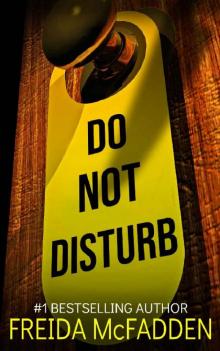 Do Not Disturb: An addictive psychological thriller
Do Not Disturb: An addictive psychological thriller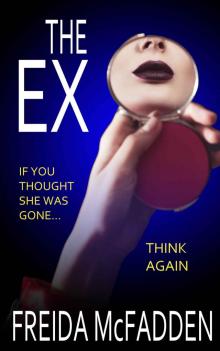 The Ex
The Ex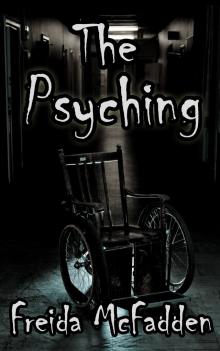 The Psyching: A Short Thriller
The Psyching: A Short Thriller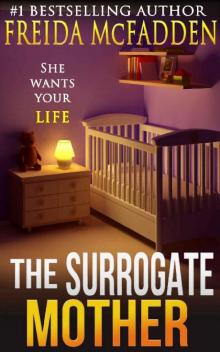 The Surrogate Mother
The Surrogate Mother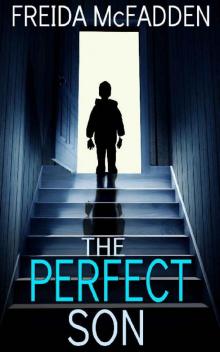 The Perfect Son
The Perfect Son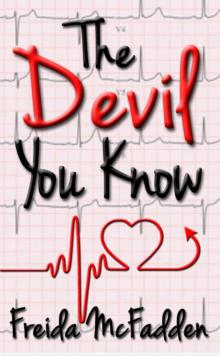 The Devil You Know
The Devil You Know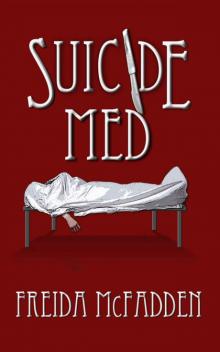 Suicide Med
Suicide Med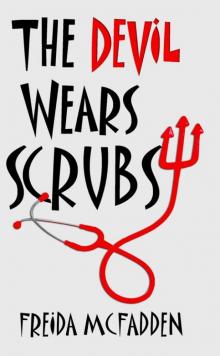 The Devil Wears Scrubs
The Devil Wears Scrubs